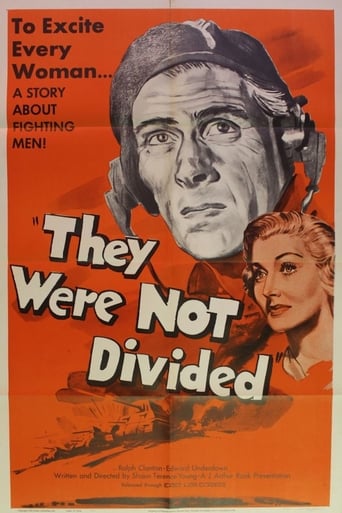clanciai
This early Terence Young film is a unique masterpiece of its kind. It tells a true story of two soldiers getting trained and fighting together from after Dunkirk up to the battle of the Ardennes, that is four years, giving a very natural and meticulous account of their lives and comrades, their jokes, their life in the barracks, their girls and wifes and sweethearts, their dreams and their every day existence at war, at the front, at the pub, at some parties - a film couldn't almost be more humanly documentary. In addition, the direction is superb all the way, perfectly natural, the pace is constantly efficient and sustained the whole way, it doesn't really tell a story, it just follows the soldiers around everywhere, the dialogue is intensive the whole way, and it is not until the last scenes when it all comes together and proves an overwhelming masterpiece. This is a film to watch again.
rjun67
This is a strange little movie, as mentioned before, it has the feel of a wartime propaganda picture, especially with its very strong pro-American, brothers-in-arms message. 'They were not divided' was in fact released in 1950, well after this kind of film was out of fashion, but having said that, the portrayal of the 3 main characters (an American, a Brit and an Irishman, serving with the Guards regiment)is warm and affectionate, and although underplayed, succeeds by involving the viewer to care about their friendship and feeling their pain and joy depending on the situation. They find themselves in every major European battle post D-Day, and in-between their love lives. The ending of the film was very sad indeed, and although we have become attached to the lead characters, we are not exposed to any over-sentimental tripe, the camaraderie feels genuine, almost real. It ain't The Dirty Dozen or The Longest Day, but it has a long forgotten quality which is sadly lacking in war movies of this day and age.
writers_reign
This was Terence Young's fourth outing behind the camera and perhaps wisely he opted to play it safe opting for a subject - the second world war - that was still providing material some five years after it ended and illustrating it via the usual tried-and-true clichés. After a somewhat stodgy, pedestrian opening Young allows his two protagonists, Edward Underdown and Ralph Campan, to steadily forge the friendship that is the core of the film. In true cliché style they met on their first day of basic training, graduated as officers together and served in the same regiment. We follow them in their day jobs through France post D-Day and in their other lives - Underdown happily married to Helen Cherry and Campan, a late developer, finding a wife of his own about the eighth reel. There was really only one way to end it and Young obliges by killing them both off in the last reel and having them buried in twin graves by a third man, a sergeant, who had also met them on the first day of basic training. Made in 1950 it's a tad hard to swallow in 2010.
Paddy-28
This is an early work of Terence Young, the director, but a well-made, engrossing and ultimately very moving British war drama of World War II. Interestingly a very young Desmond Llewelyn has a cameo role as a Welsh tank commander, and when it came time for Young to find a new Q for the second James Bond movie, the original no longer being available, he remembered Llewelyn and cast him in what is now the longest running continuous role in the James Bond saga.


